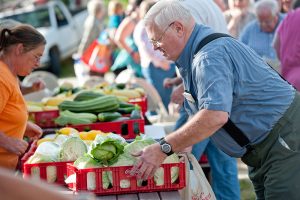Bulletin #4302, Food Safety for Food-Pantry Donations
Food for ME: Citizen Action for Community Food Recovery
Originally prepared by Nellie Hedstrom, Extension nutrition specialist, University of Maine Cooperative Extension. Revised and updated by Kate Yerxa, Extension educator, University of Maine Cooperative Extension.
For information about UMaine Extension programs and resources, visit extension.umaine.edu.
Find more of our publications and books at extension.umaine.edu/publications/.
Donating, recovering, and gleaning foods that would otherwise go to waste helps feed hungry Mainers. When recovering food, consider both safety and quality. Beware of the signs that food may be unsafe to eat. Use the following checklist to decide whether foods are unsafe to give to food pantries, cupboards, and shelters.
Foods Stored at Room Temperature
These signs may indicate that food is UNSAFE:
Cans
- Too crushed to stack on shelves or open with a manual can opener
- Crushed immediately under the end (double) seam
- Moderate/severe dents where the side and end (double) seams meet
- Rust pits severe enough to make a hole in the can
- Swollen or bulging ends
- Holes, fractures, or punctures
- Evidence of leakage
- Signs of spoilage (spurting, unusual odor or appearance) when opened
- Baby food or infant formula past the expiration date
- Missing label
Glass Jars
- Home-canned instead of commercially canned
- Raised, crooked, or loosened lid
- Damaged tamper-resistant seal
- Cracks or chips
- Signs of spoilage (discolored food; cloudy liquid)
- Dirt under the rim
- Baby food past the expiration date
Cardboard Boxes
- Torn or missing inner packaging in cartons that are slit or opened
- Evidence of insects
- Baby food past the expiration date
Plastic Containers
- Damaged tamper-resistant seals
- Signs of spoilage (mold, off odor)
- Baby food or infant formula past the expiration date
Foods Stored in Refrigerator or Freezer
These signs may indicate that food is UNSAFE:
Refrigerator Foods
- Lukewarm food (above the maximum safe refrigerator temperature of 40°F)
- Signs of spoilage (unusual odor or appearance, mold)
- Unsuitable containers and/or covers that allow food to be contaminated
- Uncertain handling history
Freezer Foods
- Evidence of thawing (ice on the food or leaking)
- Unsuitable packaging that allows food to be contaminated
When in doubt, throw it out! Don’t rely solely on look or smell. Foods that cause food poisoning may look fine and smell okay. Never taste suspicious foods!
How you can help recover food
To get involved in community food recovery, use the ideas in the Food for ME fact sheets, call the National Hunger Hotline at 800.453.2648 (800.GLEAN.IT) or 866.348.6479 (866.3.HUNGRY), or visit WhyHunger.
Food Recovery Resources
Reproduced and adapted with permission from the “Donated Food Checklist,” Food Safety References, Indiana’s Food for the Hungry (West Lafayette, IN: Purdue University). http://www.cfs.purdue.edu/safefood/foodsafety/donatedchecklist.html
Information in this publication is provided purely for educational purposes. No responsibility is assumed for any problems associated with the use of products or services mentioned. No endorsement of products or companies is intended, nor is criticism of unnamed products or companies implied.
© 1998, 2011
Call 800.287.0274 (in Maine), or 207.581.3188, for information on publications and program offerings from University of Maine Cooperative Extension, or visit extension.umaine.edu.
In complying with the letter and spirit of applicable laws and pursuing its own goals of diversity, the University of Maine System does not discriminate on the grounds of race, color, religion, sex, sexual orientation, transgender status, gender, gender identity or expression, ethnicity, national origin, citizenship status, familial status, ancestry, age, disability physical or mental, genetic information, or veterans or military status in employment, education, and all other programs and activities. The University provides reasonable accommodations to qualified individuals with disabilities upon request. The following person has been designated to handle inquiries regarding non-discrimination policies: Director of Institutional Equity and Title IX Services, 5713 Chadbourne Hall, Room 412, University of Maine, Orono, ME 04469-5713, 207.581.1226, TTY 711 (Maine Relay System).


